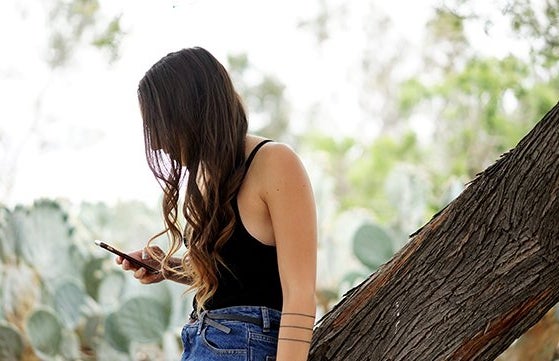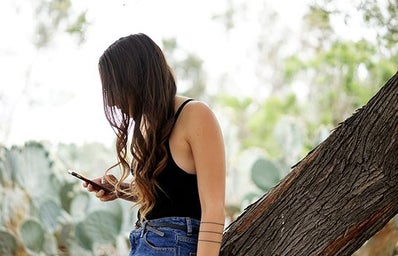Growing up, I never had social media accounts. Now, at nearly 22-years-old, I’ve only recently made my first Instagram account. Over the years, I often got some kind of reaction when I would admit I couldn’t be reached via these social media sites. I had adults who commended me, a few friends say something along the lines of “I envy you,” and then others who expressed disbelief at a reality without social media when they responded with, “So, what do you do?” Whatever end of the spectrum the person was on, the common ground was always rooted in a single question: “Why not?”
It wasn’t initially a statement. I was in middle school when Facebook reached my demographic, and since I was a child, it was an unspoken rule in my household that social media was not meant for me. I remember making an AOL messenger account, which was also in vogue at the time, and trying to be lowkey with it. As it turns out I wasn’t discrete, but my parents didn’t actually care, and it satisfied my social media itch.
By the time I got to high school, Facebook’s popularity was waning and Instagram was on the rise. Unlike Facebook, I opted out of this site on principle. As someone who’s introverted and socially anxious, the idea of connecting with a network of people did not appeal to me. I also rejected the nature of curating a picture perfect life, and I had little interest in seeing anyone else’s that I would ultimately compare myself to.
So why now?
Throughout my undergraduate experience, I felt a pull toward making social media accounts due to the field I was studying. As a Mass Communications/Media Studies major, I worried I would look inept to potential employers if I didn’t, at the very least, have my own personal accounts – just because I’ve always understood the trends doesn’t mean it will translate on paper. Becoming involved with extracurricular organizations’ social media accounts alleviated that fear slightly, but now that I’ve graduated, I felt that pull again.
Since graduating in the midst of COVID-19, I’ve found my mind wandering, thinking of the people I met along the way. My best friends, sure, but what about my co-workers and Friday night drinking buddies? Like many, I’ve had minimal social interactions in light of the pandemic. I couldn’t help but consider Instagram as a way of connection, or even a distraction.
As soon as I made an account, a high school friend of mine messaged me jokingly welcoming me to the toxic world of Instagram. I was prepared to find out for myself if Instagram was truly as toxic as many users claim.
But questionable thoughts began to crop up
I began comparing my number of followers to others, and trying to assess how many likes on a photo is average. There’s an obvious reason for the discrepancy in my Instagram followers and likes compared to others. Since I haven’t been on the platform since high school, I have considerably less followers. I didn’t think it would be in good faith to follow a bunch of people from high school that I barely remember because there’s a reason they’re no longer in my life–we never really clicked, or we grew apart. And if I was going to be honest with myself, I’d only be following them to raise my follower count. I had to remind myself that follower count doesn’t actually mean much, and I’m at an advantage not being bombarded with countless, insignificant posts from old acquaintances that I’d inevitably measure my own life to.
But I still found myself questioning the depth of my connections. Unsure who warrants a follow, I felt anxious about hitting that button with certain people, when in real life I’d have no reservations about saying hello and striking up a conservation. Following someone felt like almost too much of a commitment, but perhaps I only feel that way because I don’t know the culture as well as I thought. How close do you have to be with someone to follow them? Is it acceptable to follow someone you haven’t seen in a while? It was stressful facing these questions because I didn’t want to make an Instagram faux pas, but I also didn’t want to ask anyone because it seemed like common knowledge I should already have.

I felt just as hyper aware of presenting my life. I thought about the pictures I would capture on a trip I took recently and the pictures I would take on the hike I was planning. In truth, I tend to take lots of pictures of the places I go, but I don’t always post them or plan ahead to capture them. I sense that might change, and I’m not sure I like that.
I’ve also never really loved taking group photos, but I participate in them for my friends. I don’t love posing for a photo of myself either; it’s always felt really performative and uncomfortable to me. I find it’s incredibly time consuming to get a good one, and takes away from the moment. I love candid photos, selfies, aesthetic shots, or even forgetting I have a phone. But I may be more inclined to indulge in group shots and the self-indulgent portrait now that I’m on Instagram. It might be nice to have better documented memories and nice photos taken by someone other than myself. It could be a confidence booster, but it could quickly turn vapid and take me out of the present. It’s a fine line.
I’m also thinking about the aesthetic I want to cultivate way too much. And as expected, Instagram has been another app that I waste valuable time on (I’m looking at you, Tik Tok), and it’s exacerbating my dwindling attention span.
So, was I better off before?
The honest truth: No. I think I was just different. Sure, I’ve met people and never seen or heard from them again. I have no clue what my middle school classmates are doing right now, but I’ll also never have to worry about an employer finding embarrassing posts from ninth grade. I never had preconceived notions about people I met because of their online presence, and I never felt so trapped in a site that I had to take a social media cleanse because it was negatively affecting my mental health.
But it wasn’t that different
While I think having a social media profile on a site like Instagram in high school or college would have been damaging to my self-esteem and body image, I wasn’t the picture of perfect mental health without it. I still compared myself to others as much as the next person. I think perhaps the only difference was that the urge to compare myself was not driven by a compulsion to check notifications constantly. And maybe that helped me ever so slightly.
I also wasn’t magically 24/7 productive. In college, I still woke up and checked my phone for messages like it was the daily newspaper. I have endless lists in my Notes app of things to do, books on my shelf I haven’t read, and, at times, a less than ideal attention span. I wasn’t immune to other distractions like Netflix or Pinterest.
Living with social media comes with FOMO, but so does living without it. Instead of seeing all the things I was missing out on in real time, I just heard about it later, and was left confused and wondering what else I didn’t know about. I had less access to information, like party or event details and the latest celebrity gossip or controversy, or whether I was wasting my time crushing on a classmate who evidently had a long-term partner.

There’s almost a stigma to the anonymity that comes with not having a concrete social media presence. I occasionally felt ‘Other’ when I could tell I was perceived as such because of my choice to abstain. This feeling was more prominent in high school. In college, I was very involved on campus and had a very healthy social life, so social media or the lack thereof played an insignificant role in my world, and I am glad I went those four years without it because I know it wasn’t necessary to lead a fulfilling social life.
Do I stick with it?
I believe as an adult – and an educated woman – I’m equipped to handle upkeeping a social media profile. So, yes. I have the advantage of hindsight, unlike my peers who joined the site at an impressionable age, and before mental health was such a popular topic of conversation. I also critically think about my actions now that I’m getting older; I take more responsibility for my well-being.
There’s also a way to control what you see. You can follow accounts that make you feel good. Personally, I’ve only followed a few influencers I trust (as much as one can trust an influencer), Her Campus accounts, and personal connections.
You also have to decide how often you want to use it. I’ve turned off my notifications, as to be less inclined to check it. I’m also thinking of it as more of a public photo album, and I may try to make it artsy (a place to put my film photographs). I’ve always loved photography and creating, and I think through this lens my presence on the platform will have a little more purpose.
And, let’s not give Instagram a completely bad rap! It was actually nice getting a message from an old high school friend. Sometimes it does actually do what it was made to do – connect.


